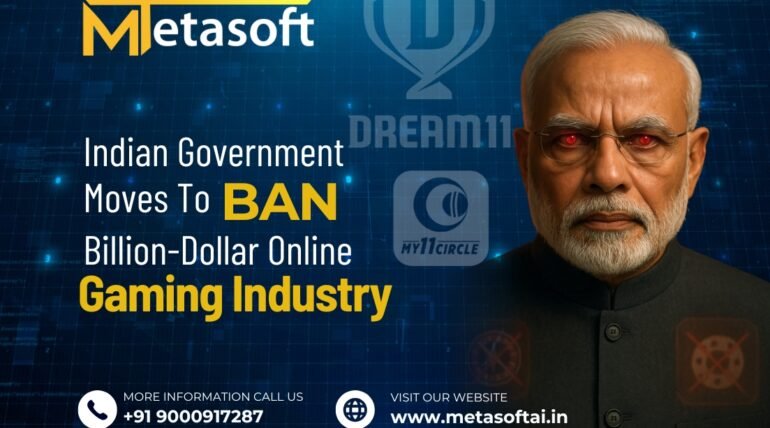
Indian Government Moves To Ban Billion-Dollar Online Gaming Industry: A Comprehensive Analysis of India’s Gaming Regulation Landscape
The Indian Government Moves To Ban Billion-Dollar Online Gaming Industry has created unprecedented ripples across the digital entertainment sector, marking a pivotal moment in India’s regulatory approach toward online gaming platforms. As we navigate through 2025, this developing story continues to shape the future of digital entertainment, fantasy sports, and online gaming ecosystems across the nation.

Understanding the Scale: India’s Billion-Dollar Gaming Revolution
The billion-dollar gaming industry ban represents more than just regulatory oversight—it signifies a fundamental shift in how Indian authorities perceive digital entertainment platforms. The online gaming sector in India has experienced exponential growth, with market valuations reaching astronomical figures that have caught the attention of policymakers and regulatory bodies nationwide.
The Current State of Online Gaming in India
Before diving into the Indian Government Moves To Ban Billion-Dollar Online Gaming Industry, it’s crucial to understand the current landscape. The Indian online gaming market has witnessed unprecedented growth, driven by smartphone penetration, affordable internet connectivity, and changing consumer preferences. Major platforms have invested heavily in user acquisition, technology infrastructure, and content creation, building a robust ecosystem that employs thousands of professionals across various domains.
The online gaming ban in India 2025 discussions have intensified as authorities grapple with balancing innovation, economic growth, and social responsibility. Industry stakeholders, including game developers, platform operators, content creators, and marketing agencies like MetaSoft AI, are closely monitoring these developments to understand their implications for digital marketing strategies and business operations.
Regulatory Framework and Government Stance
The Indian Government Moves To Ban Billion-Dollar Online Gaming Industry stems from concerns about gambling-like activities, addiction potential, and financial risks associated with certain gaming formats. Regulatory bodies have been evaluating different aspects of online gaming, including skill-based games, chance-based activities, and fantasy sports platforms.
Key Areas of Concern
Government officials have highlighted several areas that contribute to the billion-dollar gaming industry ban discussions:
- Financial Transactions and Money Laundering: Large monetary transactions within gaming platforms have raised concerns about potential misuse and lack of proper financial oversight.
- Addiction and Social Impact: The addictive nature of certain gaming formats has prompted authorities to consider stricter regulations to protect vulnerable populations.
- Lack of Comprehensive Regulation: The absence of unified regulatory framework across states has created confusion and inconsistent enforcement mechanisms.
- Cross-Border Operations: Many gaming platforms operate from jurisdictions outside India, making regulatory oversight challenging for local authorities.
Impact on Fantasy Sports and Real Money Gaming
The ban on fantasy sports India component represents a significant portion of the regulatory discussion. Fantasy sports platforms have built substantial user bases and generated considerable revenue through various gaming formats. The potential restrictions on fantasy sports operations would affect:

Fantasy Sports Ecosystem
- User Engagement: Millions of active users participate in fantasy sports across cricket, football, basketball, and other popular sports
- Revenue Models: Platform operators have developed sophisticated revenue models based on entry fees, advertising, and partnerships
- Content Creation: The fantasy sports industry has spawned a entire content ecosystem including analysis, predictions, and educational materials
- Employment Generation: Thousands of professionals work directly or indirectly with fantasy sports platforms
Marketing and Advertising Implications
For digital marketing agencies like MetaSoft AI, the online gaming ban in India 2025 presents both challenges and opportunities. Marketing strategies for gaming platforms may need significant restructuring, focusing on compliance, responsible gaming messaging, and alternative revenue streams.
Economic Impact of the Billion-Dollar Gaming Industry Ban
The Indian Government Moves To Ban Billion-Dollar Online Gaming Industry would have far-reaching economic implications across multiple sectors:
Direct Economic Effects
- Revenue Loss: Gaming platforms collectively generate billions in revenue annually, contributing to tax collections and economic activity
- Employment Impact: Direct and indirect employment in the gaming sector affects thousands of professionals
- Technology Innovation: The gaming industry drives technological advancement in areas like mobile app development, payment systems, and user experience design
- Advertising Revenue: Digital marketing agencies and advertising platforms would lose substantial revenue from gaming industry clients
Indirect Economic Consequences
The billion-dollar gaming industry ban could affect related industries including:
- Digital payment platforms
- Cloud services providers
- Mobile app development companies
- Content creation and influencer marketing sectors
- Sports broadcasting and content partnerships
International Perspective and Comparative Analysis
Examining how other countries handle online gaming regulation provides valuable context for understanding the Indian Government Moves To Ban Billion-Dollar Online Gaming Industry:
Global Regulatory Approaches

- United States: State-by-state regulation with varying degrees of restriction and acceptance
- United Kingdom: Comprehensive regulatory framework with licensed operators and consumer protection measures
- Australia: Strict regulations on certain gaming formats while allowing regulated operations
- Singapore: Controlled licensing with emphasis on responsible gaming and consumer protection
Lessons for India’s Regulatory Framework
International experiences suggest that complete prohibition may not be the most effective approach. Instead, comprehensive regulation with proper licensing, consumer protection, and responsible gaming measures might address concerns while preserving economic benefits.
Technology and Innovation Considerations
The online gaming ban in India 2025 discussions must consider technological implications and innovation potential:
Blockchain and Cryptocurrency Integration
Many modern gaming platforms incorporate blockchain technology and cryptocurrency elements, adding complexity to regulatory considerations. The billion-dollar gaming industry ban would need to address these technological aspects comprehensively.
Artificial Intelligence and Machine Learning
Gaming platforms utilize advanced AI and ML algorithms for user experience optimization, fraud detection, and personalized content delivery. These technological investments represent significant innovation potential that regulation should consider.
Consumer Protection and Responsible Gaming
Addressing concerns that drive the Indian Government Moves To Ban Billion-Dollar Online Gaming Industry requires focus on consumer protection:
Implementing Safeguards
- Age Verification: Robust systems to prevent underage participation
- Financial Limits: Deposit limits and spending controls to prevent excessive financial risk
- Addiction Prevention: Tools and resources to help users maintain healthy gaming habits
- Transparent Operations: Clear disclosure of odds, rules, and financial terms
Industry Self-Regulation
Before comprehensive government intervention, industry players could implement self-regulatory measures addressing concerns about the ban on fantasy sports India and broader gaming operations.
Digital Marketing Implications for Agencies
For digital marketing companies like MetaSoft AI, the online gaming ban in India 2025 creates both challenges and opportunities:
Adaptation Strategies
- Compliance-Focused Marketing: Developing marketing strategies that emphasize responsible gaming and regulatory compliance
- Alternative Revenue Streams: Helping gaming companies diversify into education, skill development, and entertainment content
- International Market Expansion: Supporting Indian gaming companies in expanding to international markets with favorable regulations
- Technology Consultation: Providing expertise in compliance technology, age verification, and responsible gaming tools
SEO and Content Marketing Adjustments
The evolving regulatory landscape requires careful adjustment of SEO strategies and content marketing approaches for gaming industry clients, ensuring compliance while maintaining visibility and user engagement.
Future Outlook and Industry Adaptation
The Indian Government Moves To Ban Billion-Dollar Online Gaming Industry represents an evolving situation rather than a final decision. Industry stakeholders are actively engaging with policymakers to find balanced solutions that address concerns while preserving innovation and economic benefits.
Potential Compromise Solutions

- Graduated Licensing: Implementing tiered licensing systems based on game types and risk levels
- Enhanced Oversight: Strengthening regulatory oversight without complete prohibition
- Technology Standards: Establishing technical standards for responsible gaming features and consumer protection
- Revenue Sharing: Implementing transparent revenue sharing and taxation models
Industry Transformation
Rather than viewing the billion-dollar gaming industry ban as purely restrictive, industry players are exploring transformation opportunities including:
- Educational gaming platforms
- Skill development applications
- Sports analytics and statistics platforms
- Entertainment content creation
Conclusion: Navigating the Regulatory Landscape
The Indian Government Moves To Ban Billion-Dollar Online Gaming Industry represents a critical juncture in India’s digital economy development. While concerns about gambling-like activities, addiction potential, and financial risks are legitimate, complete prohibition may not be the optimal solution.
The online gaming ban in India 2025 discussions highlight the need for comprehensive, well-considered regulation that balances innovation, economic growth, and consumer protection. For industry stakeholders, including digital marketing agencies like MetaSoft AI, adapting to this evolving landscape requires flexibility, compliance focus, and innovative thinking.
The ban on fantasy sports India and broader gaming restrictions will undoubtedly reshape the digital entertainment landscape. However, this transformation also presents opportunities for responsible innovation, enhanced consumer protection, and sustainable industry growth.
As we continue monitoring the billion-dollar gaming industry ban developments, successful adaptation will require collaboration between industry players, regulators, and support services to create a framework that serves all stakeholders effectively. The future of India’s gaming industry depends on finding balanced solutions that address legitimate concerns while preserving the innovation and economic potential that has made this sector a significant component of India’s digital economy.


